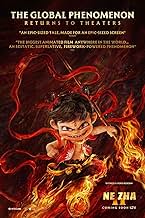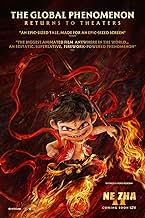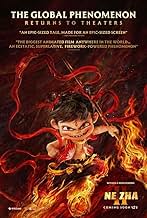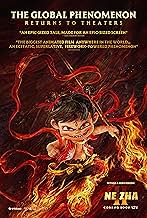Meister Taiyi Zhenren stellt die Körper von Aobing und Nezha mit Hilfe einer Lotusblume wieder her, worauf sich Ne Zha zu einem Kampf mit dem Drachenkönig aufmacht.Meister Taiyi Zhenren stellt die Körper von Aobing und Nezha mit Hilfe einer Lotusblume wieder her, worauf sich Ne Zha zu einem Kampf mit dem Drachenkönig aufmacht.Meister Taiyi Zhenren stellt die Körper von Aobing und Nezha mit Hilfe einer Lotusblume wieder her, worauf sich Ne Zha zu einem Kampf mit dem Drachenkönig aufmacht.
- Auszeichnungen
- 6 Gewinne & 1 Nominierung insgesamt
Aidyn Ahn
- Shen Xiaobao
- (English version)
- (Synchronisation)
- (as Aidyn James Ahn)
Eric Bauza
- Rat Second-In Command
- (English version)
- (Synchronisation)
- …
Robert Clotworthy
- Wuliang Xianwong
- (English version)
- (Synchronisation)
Ell
- Additional Voices
- (English version)
- (Synchronisation)
Richard Epcar
- Shen Zhengdao
- (English version)
- (Synchronisation)
- …
Damien C. Haas
- Deero
- (English version)
- (Synchronisation)
Aaron LaPlante
- Rat Boss
- (English version)
- (Synchronisation)
- …
Crystal Lee
- Ne Zha
- (English version)
- (Synchronisation)
Candi Milo
- Lady Shi Ji
- (English version)
- (Synchronisation)
- …
Zusammenfassung
Reviewers say 'Ne Zha 2' is acclaimed for its stunning animation and modern take on Chinese mythology. Breathtaking visuals, intricate details, and fluid action sequences are highlighted. Themes of identity, destiny, and self-discovery resonate deeply, with emotional depth and familial bonds emphasized. The film's cultural richness and innovative storytelling appeal globally. However, some note pacing, character development, and narrative coherence issues. Overall, it's a significant achievement in Chinese animation.
Empfohlene Bewertungen
I think one reason why this movie is getting so popular is that many people will find their own reflection in the characters and story. Be it parent-and-child relationship, friendship, stereotype about others, others prejudice on yourself, and the perception of the world that was shaped by mass and social media.
I enjoyed the whole 2.5 hours duration, with laughter, excitement and tears. To fully appreciate the story, it will be even better if you watch Nezha 1 beforehand to learn more about the background of this ancient Chinese myth. In no doubt one of my favourite and a highly recommended movie. Cannot ask for more!
I enjoyed the whole 2.5 hours duration, with laughter, excitement and tears. To fully appreciate the story, it will be even better if you watch Nezha 1 beforehand to learn more about the background of this ancient Chinese myth. In no doubt one of my favourite and a highly recommended movie. Cannot ask for more!
Lightning strikes twice with NeZha 2, a sequel that surpasses its predecessor in both narrative ambition and visual grandeur. This dazzling Chinese animated epic reimagines ancient mythology through a modern lens, blending heart-stopping action with profound emotional depth.
The film's animation is nothing short of breathtaking-oceanic battles erupt in cascades of luminescent water physics, while celestial realms shimmer with otherworldly detail. Yet beneath the spectacle lies a fiercely human story. NeZha's journey as the misunderstood demon child evolves into a gripping exploration of identity and rebellion, his combustible chemistry with Ao Bing (the Dragon Prince) crackling with tragic complexity. New characters like the enigmatic Sea Goddess add layers of moral ambiguity, challenging simplistic notions of heroism.
What truly astonishes is how director Yang Yu (Jiaozi) balances frenetic, kinetic combat (a fiery third-act showdown will leave you breathless) with quiet moments of introspection. The script weaves wry humor and tear-jerking pathos effortlessly, while traditional Chinese instruments in the score clash thrillingly with orchestral might.
More than just an animated marvel, this is cultural storytelling at its most vital-a defiant celebration of individuality that resonates across borders. Stay through the credits; the mythology is expanding, and we're all richer for it.
The film's animation is nothing short of breathtaking-oceanic battles erupt in cascades of luminescent water physics, while celestial realms shimmer with otherworldly detail. Yet beneath the spectacle lies a fiercely human story. NeZha's journey as the misunderstood demon child evolves into a gripping exploration of identity and rebellion, his combustible chemistry with Ao Bing (the Dragon Prince) crackling with tragic complexity. New characters like the enigmatic Sea Goddess add layers of moral ambiguity, challenging simplistic notions of heroism.
What truly astonishes is how director Yang Yu (Jiaozi) balances frenetic, kinetic combat (a fiery third-act showdown will leave you breathless) with quiet moments of introspection. The script weaves wry humor and tear-jerking pathos effortlessly, while traditional Chinese instruments in the score clash thrillingly with orchestral might.
More than just an animated marvel, this is cultural storytelling at its most vital-a defiant celebration of individuality that resonates across borders. Stay through the credits; the mythology is expanding, and we're all richer for it.
As the most anticipated animated blockbuster of 2025, Ne Zha 2 has grossed more than $2.2 billion since its release in China earlier this year, ranking as the fifth-highest-grossing film in global box office history. Yet its English-language version, which opened in North America last Friday (August 22), failed to sustain that momentum. Despite a robust promotional push by A24, a voice cast led by Michelle Yeoh, and a wide rollout across 2,228 theaters (including IMAX), the film earned only $1.5 million in its first three days-placing 13th at the box office. By contrast, Netflix's KPop Demon Hunters, opening the very next day in just 1,700 theaters, pulled in $18 million.
When news first broke that Ne Zha 2 would premiere in the U. S., some outlets heralded it as a "litmus test" of American audiences' appetite for Chinese storytelling. In retrospect, the results are sobering. The film's performance underscores a persistent reality: the more deeply a work is rooted in Chinese cultural elements, the harder it becomes for it to cross over in the U. S. market. Recent Chinese stage productions and cinematic blockbusters have encountered similar challenges on American soil.
Unlike the familiar narrative templates of Disney or Pixar, Ne Zha 2 leans heavily into its "mythic Chinese texture." It picks up directly from the 2019 original, with characters drawn from the 16th-century novel Investiture of the Gods and centuries of folk mythology. There is little handholding for new or unfamiliar audiences-the film plunges straight into large-scale battles. For Chinese viewers, this continuity feels seamless; for American audiences without prior knowledge, it can be alienating.
At 150 minutes, the film is epic in scope and brimming with spectacle, but its length far exceeds the typical attention span of children and, arguably, adults conditioned by TikTok. At the same time, its mix of emotional beats, slapstick humor, and shonen-style battles places it closer to Japanese anime such as Naruto or Dragon Ball Z than to Hollywood's family-oriented animated features. To viewers raised on Pixar's emotional formula or Disney's fairy-tale adventures, Ne Zha 2 comes across as "too complex" while still "not fairy-tale enough." Even a star-studded English dub cannot erase this cultural divide.
The film's rapid pacing compounds the issue. After only a brief recap, it drops viewers directly into its fantastical reimagining of ancient China, with the resurrected spirits of Ne Zha and Ao Bing immediately swept into massive battles. For those unfamiliar with the original film or the mythological references, it can feel overwhelming and disorienting.
Still, the weak North American box office should not be mistaken for a dismissal of the film's artistic or cultural value. Rather, it highlights a deeper challenge for Chinese cinema: the true barrier to "going global" is not quality, but whether its cultural language can be understood and embraced across borders.
The chilly reception to Ne Zha 2 in the U. S. points to a crucial question: how can Chinese films remain true to their cultural roots while also building more effective bridges for cross-cultural communication? The key may not lie in dubbing or casting international stars, but in finding universal emotions and narrative frameworks that resonate beyond cultural boundaries.
Of course, like Ne Zha 2 and several other record-breaking Chinese productions, these films remain enormous successes at home. The rise of large domestic studios has enabled blockbusters such as Hi, Mom and Wolf Warrior 2 to gross hundreds of millions-almost entirely from Chinese audiences. For many filmmakers and investors, overseas box office now seems increasingly secondary, if not altogether irrelevant.
When news first broke that Ne Zha 2 would premiere in the U. S., some outlets heralded it as a "litmus test" of American audiences' appetite for Chinese storytelling. In retrospect, the results are sobering. The film's performance underscores a persistent reality: the more deeply a work is rooted in Chinese cultural elements, the harder it becomes for it to cross over in the U. S. market. Recent Chinese stage productions and cinematic blockbusters have encountered similar challenges on American soil.
Unlike the familiar narrative templates of Disney or Pixar, Ne Zha 2 leans heavily into its "mythic Chinese texture." It picks up directly from the 2019 original, with characters drawn from the 16th-century novel Investiture of the Gods and centuries of folk mythology. There is little handholding for new or unfamiliar audiences-the film plunges straight into large-scale battles. For Chinese viewers, this continuity feels seamless; for American audiences without prior knowledge, it can be alienating.
At 150 minutes, the film is epic in scope and brimming with spectacle, but its length far exceeds the typical attention span of children and, arguably, adults conditioned by TikTok. At the same time, its mix of emotional beats, slapstick humor, and shonen-style battles places it closer to Japanese anime such as Naruto or Dragon Ball Z than to Hollywood's family-oriented animated features. To viewers raised on Pixar's emotional formula or Disney's fairy-tale adventures, Ne Zha 2 comes across as "too complex" while still "not fairy-tale enough." Even a star-studded English dub cannot erase this cultural divide.
The film's rapid pacing compounds the issue. After only a brief recap, it drops viewers directly into its fantastical reimagining of ancient China, with the resurrected spirits of Ne Zha and Ao Bing immediately swept into massive battles. For those unfamiliar with the original film or the mythological references, it can feel overwhelming and disorienting.
Still, the weak North American box office should not be mistaken for a dismissal of the film's artistic or cultural value. Rather, it highlights a deeper challenge for Chinese cinema: the true barrier to "going global" is not quality, but whether its cultural language can be understood and embraced across borders.
The chilly reception to Ne Zha 2 in the U. S. points to a crucial question: how can Chinese films remain true to their cultural roots while also building more effective bridges for cross-cultural communication? The key may not lie in dubbing or casting international stars, but in finding universal emotions and narrative frameworks that resonate beyond cultural boundaries.
Of course, like Ne Zha 2 and several other record-breaking Chinese productions, these films remain enormous successes at home. The rise of large domestic studios has enabled blockbusters such as Hi, Mom and Wolf Warrior 2 to gross hundreds of millions-almost entirely from Chinese audiences. For many filmmakers and investors, overseas box office now seems increasingly secondary, if not altogether irrelevant.
Just came back from AMC. The movie was awesome. Loved everything, the fighting, the visual, the plot and the funny scenes. Most importantly, loved the key message the movie is trying to deliver - good or bad (immortal vs demon) is not defined by the establishment. You define yourself and control your own destiny,never surrender to the oppression of the establishment.
Just came back from AMC. The movie was awesome. Loved everything, the fighting, the visual, the plot and the funny scenes. Most importantly, loved the key message the movie is trying to deliver - good or bad (immortal vs demon) is not defined by the establishment. You define yourself and control your own destiny,never surrender to the oppression of the establishment.
Just came back from AMC. The movie was awesome. Loved everything, the fighting, the visual, the plot and the funny scenes. Most importantly, loved the key message the movie is trying to deliver - good or bad (immortal vs demon) is not defined by the establishment. You define yourself and control your own destiny,never surrender to the oppression of the establishment.
The first time to go to cinema for us is to watch "Ne Zha 2" !A landmark in animated movie, offering a visually stunning, emotionally resonant, and culturally rich experience. Its use of new technology in fights and deep emotional narratives ensures everyone can find something to be moved by, making it a must-watch for animation enthusiasts and a testament to the global rise of Chinese filmmaking. The fight sequences are choreographed with precision, featuring dynamic camera work and creative staging. Specific scenes, like the third trial where Ne Zha faces challenges alone, showcase martial arts blended with supernatural abilities, rendered in the distinctive ink-wash style.
Wusstest du schon
- WissenswertesNe Zha 2 became the highest-grossing Chinese and non-English film of all time (surpassing The Battle at Lake Changjin (2021)). It also became the highest-grossing film of all time in a single market (surpassing Star Wars: Episode VII - Das Erwachen der Macht (2015)) and became the first non-Hollywood production to join the billion dollar club (57th overall).
- VerbindungenFeatured in SBS World News: Folge vom 16. Februar 2025 (2025)
Top-Auswahl
Melde dich zum Bewerten an und greife auf die Watchlist für personalisierte Empfehlungen zu.
Details
- Erscheinungsdatum
- Herkunftsland
- Offizieller Standort
- Sprachen
- Auch bekannt als
- Na Tra 2: Ma Đồng Náo Hải
- Produktionsfirmen
- Weitere beteiligte Unternehmen bei IMDbPro anzeigen
Box Office
- Budget
- 80.000.000 $ (geschätzt)
- Bruttoertrag in den USA und Kanada
- 23.322.209 $
- Eröffnungswochenende in den USA und in Kanada
- 7.687.776 $
- 16. Feb. 2025
- Weltweiter Bruttoertrag
- 2.150.000.000 $
- Laufzeit
- 2 Std. 24 Min.(144 min)
- Farbe
- Sound-Mix
- Seitenverhältnis
- 2.39 : 1
Zu dieser Seite beitragen
Bearbeitung vorschlagen oder fehlenden Inhalt hinzufügen

































